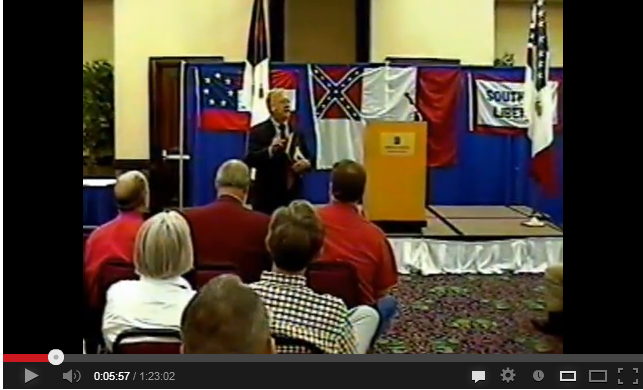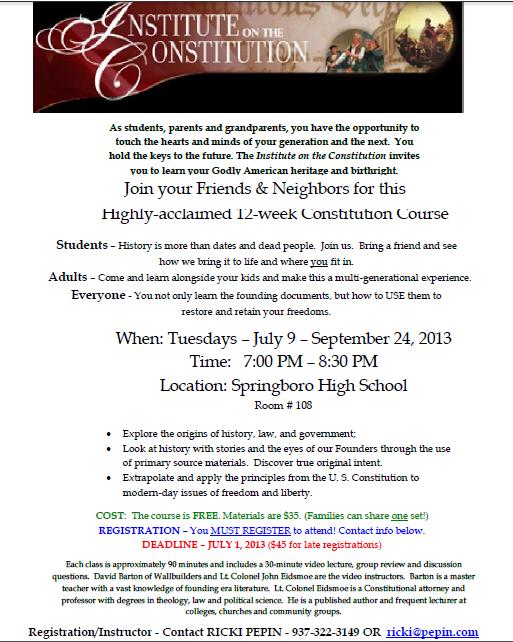Thursday nights at 8:00pm (eastern), the National Religious Broadcasting Network is showing the Constitution course developed by the Institute on the Constitution. A version of the IOTC’s course was planned as a public offering by the Springboro (OH) School District from July through September but was canceled at the last minute due to complaints from community members.
Unlike the Ohio course, the NRB broadcast version does not include David Barton or John Eidsmoe. Rather, IOTC co-founder Michael Peroutka and pastor David Whitney teach this version of the course. In prior posts, I have pointed out that Peroutka is a board member of the League of the South and Whitney is the chaplain of the Maryland chapter of the League.
I watched session two of the course last Thursday. The session was about the influence of Puritan political theory on the founders and the religious views of the founders. In this post, I want to make a few observations about Peroutka’s views of the Puritans.
In the first part of the session, Peroutka discusses what he believes are contributions of the Puritans to American law and government. Generally, he attempted to draw a straight line from the Puritans to the American Constitution. For instance early in the program, he said, “Civil government has jurisdiction over our actions but not our conscience. Conscience is between God and man.” Peroutka claims this principle comes from the Puritans. However, in my opinion, his effort to find liberty of conscience in the Puritan theory of government fails because he ignores what the Puritan government did.
While it may have been fashionable at one time to link the Puritans to liberty (and some Puritans did speak about “liberty of conscience” — e.g., British clergy William Perkins), a review of basic events will contradict that notion. It is well documented that non-Puritans were not well tolerated in Massachusetts. For instance, Roger Williams was exiled to Rhode Island and set up real religious freedom there. Of course, there is problem of the witch trials. Furthermore, Quakers were often tortured and sometimes killed for their beliefs.
For instance in the Annals of Salem, this order was passed in 1661:
May 22d. General Court sat. Wm Hathorne and Edmund Batter were Deputies. The former was chosen first reserve Commissioner for the Colony. The Court order that Quakers when discovered shall be made bare from the middle upwards tied to a cart and whipped through the town towards the boundary of Massachusetts, and if returning, that they shall be similarly punished with the addition that some them shall be branded with an R on their left shoulder, and if coming back a third time that they be banished on pain of death.
Pain of death had already visited dissenters prior to the Salem edict. The Boston Martyrs were four Quakers who were executed for their beliefs beginning in 1659. Eventually the British King stopped the executions in 1661.
Nineteenth century historian, George Edward Ellis described the Puritan view of “liberty of conscience:”
The inane assertion, so often flippantly repeated that the Massachusetts colonists came here to seek and to provide a field for the enjoyment of liberty of conscience, and then proved faithless to their profession by securing the right for themselves and denying it to others is simply false to all the facts of the case. What is now really meant by the phrase liberty of conscience was something which those Puritans regarded with shuddering abhorrence. It might with much more truth be said that the leaders of the colony came here to be rid of the liberty of conscience, which was working and showing its fruits in England as will appear on our future pages. Nor is it an adequate interpretation of their errand here to say that they were seeking liberty even for their own consciences. That liberty was already pledged and fettered put under bonds and limitations it was held in subjection to a stern and exacting rule of life and duty found not in their own thinkings and willings but in the Word of God. This complete abnegation of the privilege and license which we associate with liberty of conscience must be kept in mind in all our reading about the beliefs and doings of these Puritans. Fallen and wrecked as in their belief the nature of man was, they would not entertain the thought that any one, however earnest he might be, could find his rule within his own resources of thinking and believing. They read the sentence repeated several times in the Book of Judges that in the lack of any supreme authority every man did that which was right in his own eyes as equivalent to saying that he did what was wrong in the eyes of everybody else.
During the session, Peroutka uses the topic of liberty of conscience to condemn hate crimes legislation. He says several times, “There is no such thing as a hate crime.” He adds that you can’t punish thoughts and opinions. However, his Puritans did. The Puritans passed laws regulating life in minute and intrusive ways. Contrary to Peroutka’s claims that the Puritans gave us liberty of conscience, consider the Cambridge Platform of 1648. The following principles promote the state regulation of private religious belief and action:
It is the duty of the magistrate to take care of matters of religion and to improve his civil authority for the observing of the duties commanded in the first as well as for observing of the duties commanded in the second table [of the Ten Commandments]. They are called gods. The end of the magistrate’s office is not only the quiet and peaceable life of the subject in matters of righteousness and honesty, but also in matters of godliness, yea of all godliness. (p 84)
Idolatry, blasphemy, heresy, venting corrupt and pernicious opinions that destroy the foundation, open contempt of the Word preached, profanation of the Lord’s day, disturbing the peaceable administration and exercise of the worship and holy things of God, and the like are to be restrained and punished by civil authority. (p, 85)
If any church, one or more, shall grow schismatical, rending itself from the communion of other churches or shall walk incorrigibly or obstinately in any corrupt way of their own contrary to the rule of the Word, in such case the magistrate is to put forth his coercive power as the matter shall require. (p 85)
Roger Williams was banished from Massachusetts because he “broached & dyvulged dyvers newe & dangerous opinions against the authoritie of magistrates” Anne Hutchinson was banished due to her beliefs about worship. Clearly the Puritans in power punished thoughts and opinions.
Actually, a more interesting aspect of Puritan history is the transition from theocratic impulses to the American revolution. The people in the colonies went a long way from state religion and control to a Constitution which contained no meaningful religious reference and no religious test for office. Peroutka’s Constitution course completely misses this, apparently because he wants to teach American law and government as a Puritan invention.
In the next post, I will address Peroutka’s thoughts on the religious beliefs of the founders. They are quite Barton-like and so it is familiar ground.

